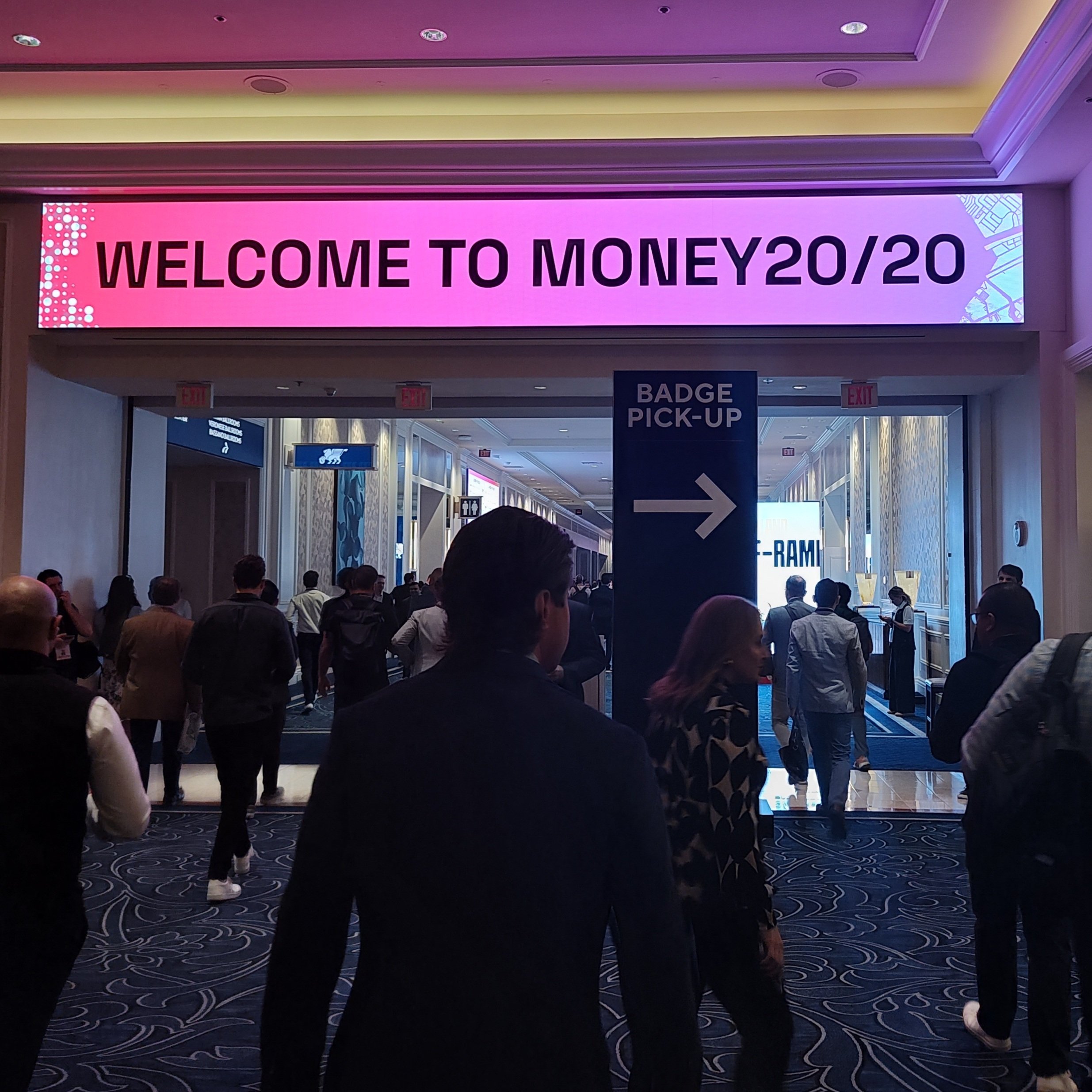To wrap up Money 20/20 Europe, which is always one of our favorite events of the year, we gathered all of the best insights and the most relevant discoveries from the discussions that lead our industry into a bright future, and which dominated the conversations in Amsterdam on June 3-5.
Deeply interested in the systems powering Open Banking and in what a future with robot-to-robot transactions will look like, Money 20/20 also dived into the future of the banking industry and the role of banks as fintech evolves, as well as the long-term impacts of AI in our industry and in our understanding of trust and in e-commerce, especially with Agentic AI.
Here’s what we think of those and other key topics from Money 20/20 Europe:
The state of Open Banking
Everyone agrees Open Banking is here to stay, and that financial companies must invest in implementing it. But what is the current state of the systems powering Open Banking – are they keeping up with business needs? With 52% of companies not actually tracking how many customers keep their consent for data sharing through Open Banking throughout a 6-month period, and 20% of businesses reporting API failures in 1% of all calls, the problem with Open Banking might be in product design rather than in the standardization.
For Money 20/20 Europe’s speakers, one of the reasons for this is that Open Banking was – and still is – treated as a compliance project, leading the industry to now face issues not with regulation or data privacy, but with long-term efficiency, scalability and customer retention.
Customer interest and market value for Open Banking have already been more than proved, but the model has the potential to generate even more substantial changes in the payments landscape. Thus, the industry will be able to create new, interoperable, interconnected payment products that last and create real transformation: “Open Banking is the foundational layer, an enabler of the next generation of payment services”, declared Valérie Nowak, VP of Open Banking – APEMEA at Mastercard.
Meanwhile, when we expand the horizon to look into Open Finance, the keyword is data: it is a data-driven business model, which looks – or should look – into more than just bank-to-bank data, but all kinds of financial services history, to expand product offering.
The everlasting importance of cards
In the age of Alternative Payment Methods (APMs), one might be tempted to overlook the key role cards continue to play in the payments ecosystem. Still responsible for the majority of volume share on the market, cards push financial companies to invest not necessarily in innovating the product, but the systems behind it, to ensure that cards do not lose that spot.
With so many different, new payment methods and financial possibilities, customers today expect a lot from cards: fully bundled programs, loyalty benefits, cutting-edge security features, highly tailored value-added services. Hyper personalization is extremely important: “if you try to build something for everyone, you will end up with something for no one”, pointed out Nabil Manji, SVP of Fintech Growth & Financial Partners at Worldpay.
And in today’s fintech world, meeting and surpassing customer expectations is fundamental for companies interested in longstanding success and relevance. More and more, the ecosystem around cards turns them into true staples of the fintech industry, powering the trends, data-based research, partnerships, and product development that impact the whole industry.
The future of banking
We live in a time of constant, fast, and unpredictable change, leading every industry to strive to predict what’s coming. As we discussed after South by Southwest 2025, the conversation has been shifting: it's no longer about trying to predict the future, but about preparing for change – no matter what it is –, and about building the future we envision. Adaptability and action, not prediction.
Continuing discussions also present at Money 20/20 Asia 2025, which looked into how we are building the fintech industry of tomorrow, the European show dived into the building blocks of the banking industry of the future – and the role each fintech business plays in it.
“Every company today is trying to be faster, to have the best UX, but we should actually be looking more closely not only at speed, but also at security”, reinforced Caxton’s COO Alana Parsons. AI can play a huge role in that, allowing stronger, more assertive security measures while retaining agility and seamlessness for the user. However, as important as Artificial Intelligence is for fraud prevention, the main AI-topic so far at Money 20/20 Europe 2025 was different – check out our next highlight of the event for more about that.
Agentic AI and the dawn of Agentic Commerce
Human users connecting with AI-powered solutions? That is already old news. The talks at Money 20/20 are all about agentic AI, and interactions carried out completely between two AI agents: the user’s own agent interacting with a company’s agent, allowing for no-effort online shopping, for example.
For that to happen and to become a part of our daily lives, however, a lot of systems need to be in place: we need to trust that the AI agents – our own and the merchant’s – will be able to purchase the actual item we want, with no mishaps in any part of the journey.
The most important step for that is the actual checkout: “without actually completing the payment on our behalf, the AI agent is just a fancy personal shopper”, defined Mathieu Altwegg, SVP Products & Solutions for Visa Direct in Europe.
Getting to that stage requires clear, comprehensive workflows and well-defined metrics of what success looks like – and no matter how advanced the technology is, at the end of the day, the humans using it, and for what it is for, need to trust it. Without that, the whole system crumbles under itself.
As Thredd’s CEO Jim McCarthy reinforced, we have to make sure innovation creates true value for our customers: otherwise, it is “the industry just talking to itself, without considering the end-user. Is it solving a problem for the end-user or not?”. Agentic AI can definitely do that, but it requires not only a regulatory framework and scalable technology, but an understanding of what trust looks like in the era of Artificial Intelligence.
What does it take for a new payment method to explode?
Around the world, customers have been very enthusiastic about Alternative Payment Methods (APMs), which are driving innovation, access, and new businesses across the fintech industry. In Poland, mobile payment system BLIK, launched in 2015, accounts for almost half of all online payments in the country and is the #1 method for e-commerce.
The scenario should extend throughout Europe as the European Union’s Instant Payments Regulation settles in. Established in early 2024, the Instant Payments Regulation will be fully enforced in Euro-member states by the end of 2025, while non-Euro member states should have its rules implemented by mid-2027.
With requirements about sending and receiving instant payments, PSPs within the European Unions must be able to ensure 24/7 availability and processing in under 10 seconds. That is already the case in Brazil, with Pix – true instant processing, available all the time. If that becomes reality in the European Union, it could be a game-changer.
And the perspectives are highly positive, as regulatory push toward standardization and acceptance is essential for a wide, scalable adoption rates – we discussed that further in our coverage of Money 20/20 Asia at our LinkedIn newsletter, so be sure to check that out as well.
The expectations and challenges surrounding wallets
Besides instant payments, e-wallets have been an important Alternative Payment Method for a while and still have a lot of room for growth. At Money 20/20 Europe, experts consider that one of the most important aspects that can push wallets even further is interoperability.
The European fintech industry is working toward building a wallet infrastructure that ensures that European users can pay around the region as if they were in their own home country, pushing penetration and usage rates.
Furthermore, value-added services are also considered a key strategy in the evolution of wallets, if they want to keep growing even while instant payment methods bloom across Europe. At the end of the day, in this “war”, the customers are the winners.
Building a future-proof sense of trust
Wallets, instant payments, e-commerce – all striving to build connection, to scale amidst competition, to evolve in a customer-centric way, to have a robust portfolio of value-added services. Without trust, though, a financial app is... just an app. To build true interoperability, innovation, and long-term impact in the daily lives of the customers and on the market, having trust as a pillar is absolutely essential.
At Money 20/20 Europe 2025, it is clear that the industry knows where it wants to go to, but it is key that fintech companies, banks, and all players of the industry focus now on the execution – to build truly interconnected, standardized, regulated, and innovative solutions.
For that, the financial industry has a lot of different data about their customers, especially with Open Banking, and that should lead to a holistic approach to customer behavior: instead of looking separately at current account data, at credit data, at mortgage data, an omnichannel strategy can allow you to look into all of that, thus understanding where your customer is at in a much more complete, individualized way.
Regular usage, after all, is required for any payment method or payment solution that wants to scale and be truly impactful. Are you solving real problems of real people in their real lives? And besides that: do those real people trust you, your product, and your company? If you can answer yes to both questions, you are on the way to success.
Trust is the word mentioned by 99% of speakers throughout the event – and as the fintech world advances and becomes more complex, being able to build and retain that sense of trust from the customers is going to become more and more difficult, but also more and more urgent.
The conversations from Money 20/20 linger long after the event, so stay around to continue getting exclusive insights, market data, and much more about cross-border businesses, alternative payment methods, opportunities in Latin American markets, and other relevant topics for our industry.
And to connect (or reconnect) with our Sales Representatives after the event, click below to contact us:
.jpg)


.jpg)

